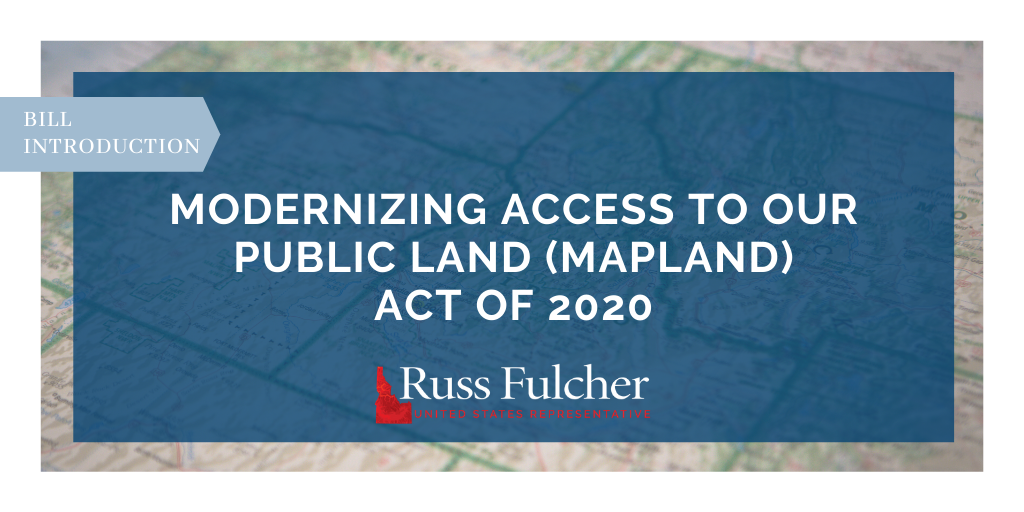Contact:
Alexah Rogge
202-225-6611
alexah.rogge@mail.house.gov
WASHINGTON, D.C. -- Today Rep. Russ Fulcher introduced the Modernizing Access to our Public Land (MAPLand) Act of 2020. Rep. Derek Kilmer (D-WA) joined Rep. Russ Fulcher to introduce this bill in the House, while Senator Martha McSally (R-AZ) and Senator Angus King (D-ME) introduced it in the Senate.
The MAPLand Act of 2020 will standardize the digitization and dissemination of information regarding recreational access and allowable activities on millions of acres of federal public lands throughout Idaho and the United States. Doing so will make millions of Americans, including hunters, anglers, and outdoor recreationists, increasingly aware of opportunities to access and use their public lands in a manner beneficial to innumerable local and regional economies.
Rep. Fulcher commented, “Sportsmen and outdoor recreationalists have a tremendous impact on our Idaho culture and economy. I am proud to be introducing the MAPLand Act to modernize information and access to our public lands so Idahoans can utilize these public places.”
“Growing up on the Olympic Peninsula, I saw firsthand how special our region is and how our public lands contribute to the fabric of who we are. Having worked in economic development professionally for over a decade, I also saw that folks in our region rely on access to our public lands to support our growing outdoor economy,” said Rep. Kilmer. “I’m proud to co-sponsor this bipartisan bill to standardize and modernize information regarding public lands – so our outdoor recreation community can continue to bolster our local economies.”
“As an avid hiker and outdoorswoman, I know first-hand the importance of having accurate mapping and access data for public lands,” Senator McSally said. “My legislation will increase recreational opportunities and allow people to more fully enjoy and appreciate the beauty of our public lands by making it easier to find information for expeditions.”
“America’s public lands are some of our nation’s greatest treasures, providing opportunities for outdoor enthusiasts of all generations to connect with the bountiful natural gifts that surround us all,” said Senator King. “The rise of mapping technologies creates new opportunities to modernize safety and access in helping Americans recreate in the outdoors through fishing and hunting – if we can make sure these lands are accurately mapped and that information is easily accessible. This is a win-win, helping the American people take in our beautiful country and supporting local economies and recreation businesses, and I’m proud to lead this bipartisan effort.”
“GPS technology has become an essential part of the public-land user’s toolkit. This bill will allow sportsmen and women to take full advantage of the world-class opportunities on our public lands, make it easier to follow the rules while recreating outside, and reduce access conflicts,” said Whit Fosburgh, president and CEO of the Theodore Roosevelt Conservation Partnership. “Quite simply, this is a common-sense investment in the future of hunting, fishing, and outdoor recreation. We want to thank Senators McSally and King and Representatives Fulcher and Kilmer for taking the lead on this important legislation.”
“The No. 1 reason hunters and anglers stop pursuing their outdoor passions is insufficient access,” said Land Tawney, president and CEO of Backcountry Hunters and Anglers. “BHA thanks Sens. McSally and King and Reps. Kilmer and Fulcher for introducing commonsense legislation that requires federal land management agencies to collect data on accessible public lands – and make it digitally available to millions of people. Hunters, anglers and other outdoor enthusiasts will know where they can access public lands with the help of 21st century mapping technologies. This will also benefit local economies that depend on the outdoor recreation industry.”
Currently, the federal land management agencies — including the U. S. Forest Service, Bureau of Land Management, National Park Service, and Army Corps of Engineers — lack the resources and capacity needed to undertake these tasks on the lands they administer. For example, many of the agencies’ access easement records are still held on paper files at local offices and cannot be integrated into digital mapping systems. The U.S. Forest Service alone has an estimated 37,000 recorded easements, only 5,000 of which have been digitized and uploaded into their electronic database.
Both Congress and the Trump Administration have recently taken action to help create additional access for outdoor recreation on inaccessible public lands. To complement this progress, it is vital that information about new and existing public lands access and allowable uses be comprehensively collected, organized, and made publicly available in a manner that is easily digestible to the public and compatible with increasingly popular mapping and GPS technologies.
